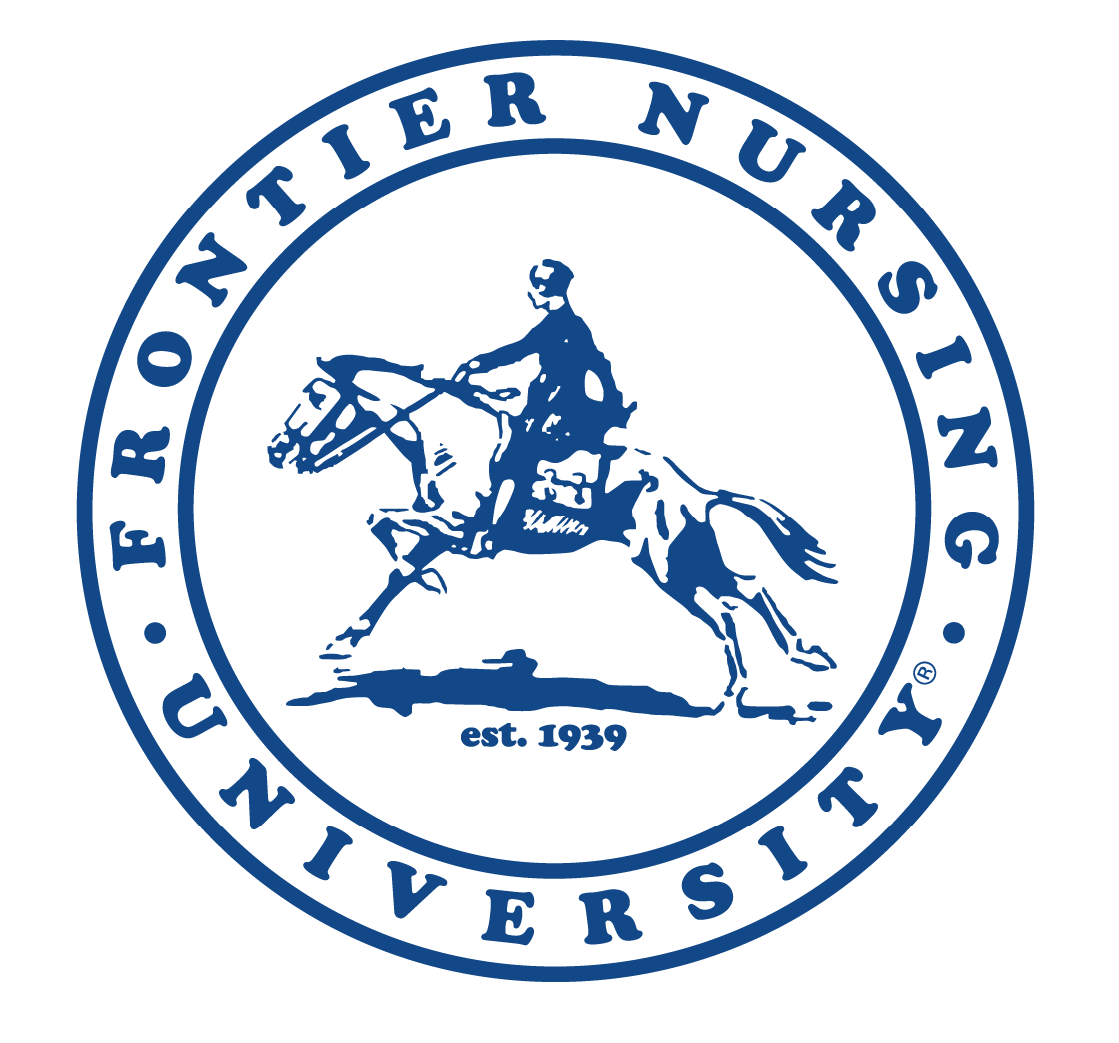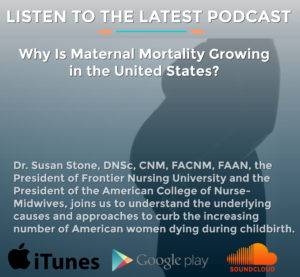 Dr. Susan Stone, DNSc, CNM, FACNM, FAAN, certified nurse-midwife, President of Frontier Nursing University (FNU) and President of the American College of Nurse-Midwives (ACNM), recently sat down with Andrew Bennie of Springer Publishing Group to continue the ongoing conversation about how to end maternal mortality. Dr. Stone has been working in the field of reproductive health care for women for over 30 years, and is an advocate for women seeking an emotional and physically satisfying childbirth.
Dr. Susan Stone, DNSc, CNM, FACNM, FAAN, certified nurse-midwife, President of Frontier Nursing University (FNU) and President of the American College of Nurse-Midwives (ACNM), recently sat down with Andrew Bennie of Springer Publishing Group to continue the ongoing conversation about how to end maternal mortality. Dr. Stone has been working in the field of reproductive health care for women for over 30 years, and is an advocate for women seeking an emotional and physically satisfying childbirth.
The conversation, recorded on a “Nursecast” podcast episode by Springer Publishing, is linked here.
Dr. Stone recently published pieces on maternal mortality on DailyNurse.com and KYForward. As evidenced in those articles, she explains that the United States has been seeing a dramatic rise in the maternal mortality rate. According to data, 700 women around the U.S. die of pregnancy complications per year, while 50,000 cases are near misses. Many of these cases are disproportionately correlated to race.
“Maternal mortality happens with women of color three to four times more than it does Caucasian women,” said Dr. Stone. Moreover, the overall health of women in the U.S. has taken a downturn in the last twenty years.
“We are seeing women with more medical complications when they enter labor,” said Dr. Stone. “You have in-hospital issues such as hemorrhages, hypertension, gestational diabetes, obesity – those are contributing to the sentinel events that are occurring.”
Dr. Stone’s main focus is how to prevent women from getting to the point where complex problems challenge their health outcomes in pregnancy. Social issues, lack of access to healthcare through insurance, lack of accessible clinic care in rural areas and poor communication are among some of the biggest culprits in the rising maternal mortality rate.
To chip away at the problem, Dr. Stone points to the need to diversify the healthcare workforce to provide race-concordant care. Patients are more receptive to care from a health provider who understands their culture and socioeconomic background. Currently, only 6% of midwives are women or men of color. FNU’s initiative to diversify not only the field of midwifery, but the healthcare workforce as a whole, has made great strides. To date, 22% of FNU students are men and women of color – up from just 9% in 2010.
As President of ACNM, Dr. Stone is also working on several legislative agendas to bring about change. Maternal mortality review committees, which ACNM would like to see established in every state, could be a key to getting down to the cause of maternal mortality.
“The idea is to do root-cause analysis on every single mortality that happens, and then you start to see trends,” said Dr. Stone. “When you start to see trends, you can start to create programs to address those problems. And then you can start to see some results.”
Nurses around the nation are urged to step up to be a vessel for positive change.“Make sure you are a member of an organization,” said Dr. Stone. “We all need to be able to lobby, vote and participate on different committees.”
Though still an uphill climb, Dr. Stone is hopeful about the changes that are already being put into place to lower the rate of maternal mortality.
“I can see more collaboration now, even across all disciplines, than I have ever seen in my nearly 35 years of working in this industry,” she said. “Together, we really can make a difference.”
Read about Dr. Stone’s FNU Digital Summit presentation, “Maternity Workforce Shortages: Consequences and Possible Solutions,” here.
To listen to more maternal mortality-related podcasts, visit Nursecast.com.
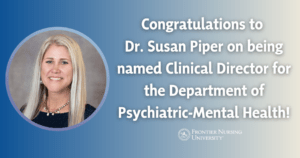
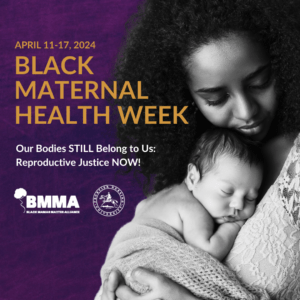
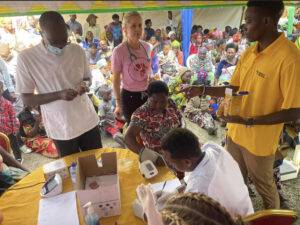


 Vanessa Cameron works for Vanderbilt University Medical Center in Nursing Education & Professional Development. She is also attending George Washington University and progressing towards a PhD in Nursing with an emphasis on ableism in nursing. After becoming disabled in April 2021, Vanessa’s worldview and perspective changed, and a recognition of the ableism present within healthcare and within the culture of nursing was apparent. She has been working since that time to provide educational foundations for nurses about disability and ableism, provide support for fellow disabled nursing colleagues, and advocate for the disabled community within healthcare settings to reduce disparities.
Vanessa Cameron works for Vanderbilt University Medical Center in Nursing Education & Professional Development. She is also attending George Washington University and progressing towards a PhD in Nursing with an emphasis on ableism in nursing. After becoming disabled in April 2021, Vanessa’s worldview and perspective changed, and a recognition of the ableism present within healthcare and within the culture of nursing was apparent. She has been working since that time to provide educational foundations for nurses about disability and ableism, provide support for fellow disabled nursing colleagues, and advocate for the disabled community within healthcare settings to reduce disparities. Dr. Lucinda Canty is a certified nurse-midwife, Associate Professor of Nursing, and Director of the Seedworks Health Equity in Nursing Program at the University of Massachusetts Amherst. She earned a bachelor’s degree in nursing from Columbia University, a master’s degree from Yale University, specializing in nurse-midwifery, and a PhD from the University of Connecticut. Dr. Canty has provided reproductive health care for over 29 years. Her research interests include the prevention of maternal mortality and severe maternal morbidity, reducing racial and ethnic health disparities in reproductive health, promoting diversity in nursing, and eliminating racism in nursing and midwifery.
Dr. Lucinda Canty is a certified nurse-midwife, Associate Professor of Nursing, and Director of the Seedworks Health Equity in Nursing Program at the University of Massachusetts Amherst. She earned a bachelor’s degree in nursing from Columbia University, a master’s degree from Yale University, specializing in nurse-midwifery, and a PhD from the University of Connecticut. Dr. Canty has provided reproductive health care for over 29 years. Her research interests include the prevention of maternal mortality and severe maternal morbidity, reducing racial and ethnic health disparities in reproductive health, promoting diversity in nursing, and eliminating racism in nursing and midwifery. Dr. Lisa Meeks is a distinguished scholar and leader whose unwavering commitment to inclusivity and excellence has significantly influenced the landscape of health professions education and accessibility. She is the founder and executive director of the DocsWithDisabilities Initiative and holds appointments as an Associate Professor in the Departments of Learning Health Sciences and Family Medicine at the University of Michigan.
Dr. Lisa Meeks is a distinguished scholar and leader whose unwavering commitment to inclusivity and excellence has significantly influenced the landscape of health professions education and accessibility. She is the founder and executive director of the DocsWithDisabilities Initiative and holds appointments as an Associate Professor in the Departments of Learning Health Sciences and Family Medicine at the University of Michigan. Dr. Nikia Grayson, DNP, MSN, MPH, MA, CNM, FNP-C, FACNM (she/her) is a trailblazing force in reproductive justice, blending her expertise as a public health activist, anthropologist, and family nurse-midwife to champion the rights and health of underserved communities. Graduating with distinction from Howard University, Nikia holds a bachelor’s degree in communications and a master’s degree in public health. Her academic journey also led her to the University of Memphis, where she earned a master’s in medical anthropology, and the University of Tennessee, where she achieved both a master’s in nursing and a doctorate in nursing practice. Complementing her extensive education, she completed a post-master’s certificate in midwifery at Frontier Nursing University.
Dr. Nikia Grayson, DNP, MSN, MPH, MA, CNM, FNP-C, FACNM (she/her) is a trailblazing force in reproductive justice, blending her expertise as a public health activist, anthropologist, and family nurse-midwife to champion the rights and health of underserved communities. Graduating with distinction from Howard University, Nikia holds a bachelor’s degree in communications and a master’s degree in public health. Her academic journey also led her to the University of Memphis, where she earned a master’s in medical anthropology, and the University of Tennessee, where she achieved both a master’s in nursing and a doctorate in nursing practice. Complementing her extensive education, she completed a post-master’s certificate in midwifery at Frontier Nursing University.









 Dr. Tia Brown McNair is the Vice President in the Office of Diversity, Equity, and Student Success and Executive Director for the Truth, Racial Healing, and Transformation (TRHT) Campus Centers at the American Association of Colleges and Universities (AAC&U) in Washington, DC. She oversees both funded projects and AAC&U’s continuing programs on equity, inclusive excellence, high-impact practices, and student success. McNair directs AAC&U’s Summer Institutes on High-Impact Practices and Student Success, and TRHT Campus Centers and serves as the project director for several AAC&U initiatives, including the development of a TRHT-focused campus climate toolkit. She is the lead author of From Equity Talk to Equity Walk: Expanding Practitioner Knowledge for Racial Justice in Higher Education (January 2020) and Becoming a Student-Ready College: A New Culture of Leadership for Student Success (July 2016 and August 2022 Second edition).
Dr. Tia Brown McNair is the Vice President in the Office of Diversity, Equity, and Student Success and Executive Director for the Truth, Racial Healing, and Transformation (TRHT) Campus Centers at the American Association of Colleges and Universities (AAC&U) in Washington, DC. She oversees both funded projects and AAC&U’s continuing programs on equity, inclusive excellence, high-impact practices, and student success. McNair directs AAC&U’s Summer Institutes on High-Impact Practices and Student Success, and TRHT Campus Centers and serves as the project director for several AAC&U initiatives, including the development of a TRHT-focused campus climate toolkit. She is the lead author of From Equity Talk to Equity Walk: Expanding Practitioner Knowledge for Racial Justice in Higher Education (January 2020) and Becoming a Student-Ready College: A New Culture of Leadership for Student Success (July 2016 and August 2022 Second edition).